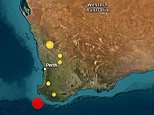Doctors thought my ‘childish’ husband was depressed…it was actually dementia at age 38

When 38-year-old Stefan Tankov started behaving strangely in the fall of 2022, doctors assumed it was caused by depression and type 2 diabetes.
His wife, Sile, now 42, began to notice changes in his personality; he became emotionally withdrawn and “childlike,” needing her help for simple tasks such as getting on a bus.
Within six months he was doing things completely out of character, such as stealing bottles of wine from local stores.
Only then was he referred to a specialist who performed neurological tests that revealed a devastating diagnosis: early-onset dementia.

After Stefan and Sile Tankov’s wedding day in April 2021, they were in their own bubble, but within two years everything started to fall apart

In September 2022, Sile, now 42, began to notice changes in Stefan’s personality: he became less emotional and “childlike” and even had difficulty taking the bus alone
Sile, a high school teacher, first noticed Stefan’s personality change when he stopped asking her how her day was and instead asked what was for dinner.
He was unusually stiff about the time he ate his dinner, after which he went straight to bed.
She remembers his confusion when she asked him to take the bus to visit her in the hospital.
He struggled to hold down a job, became unusually withdrawn, and repeatedly forgot simple tasks that his wife asked him to do.
She assumed that her husband was depressed and made an appointment with the doctor for a check-up.
The doctor performed tests that showed he had type 2 diabetes, concluding that his symptoms were a combination of the disease and mental health problems.
“We thought it was confusing, but he didn’t improve,” Sile said.
‘Halfway through a doctor’s appointment he got up and left. I had to bribe him with a McDonald’s to come back. It was like interacting with a child.”

It wasn’t until Stefan started stealing wine from their local shop in April 2023 that she took him to hospital, where tests showed his cognitive function was ‘very low’.

Stefan struggled to keep a job and started working as a temporary worker. He became withdrawn and repeatedly forgot simple tasks that Sile asked him to do

The family decided to take Stefan to the hospital, where tests showed his cognitive function was “very low.” Doctors ordered MRI and CT scans with a full psychological report
Six months later, in April 2023, Sile noticed that the staff at a local store was “getting a little confused.” Her husband walked up to her and told her he had been banned from the company.
The store owner had repeatedly caught Stefan trying to steal bottles of wine.
The family decided to take Stefan to the hospital, where tests showed his cognitive function was “very low.” Doctors ordered MRI and CT scans with a full psychological report.
After the hospital visit, Sile cared for him at home for the next four weeks.
She said: ‘One morning I saw him about to put his hands on the hob, which was bright red, to see if it was warm. He wandered off, walking in front of cars and staring at people. We stopped going out. He started vaping and was incontinent.
‘I don’t know how I kept it up. “I was lucky enough to be able to take time off from work, but I had to go back or we wouldn’t have any money,” she added.
Sile took her husband back to hospital where he had CT and MRI scans and a lumbar puncture before being given a devastating diagnosis of frontotemporal dementia – an unusual form of the disease that causes problems with behavior and language.
“I was completely shocked…we were hoping to start a family,” Sile said.

Dementia is the biggest cause of death in Britain, affecting around a million people in the country

The charity estimates that more than 70,000 people suffer from early-onset dementia, with symptoms starting before the age of 65.
Dementia is the biggest cause of death in Britain, affecting around a million people in the country.
It is estimated that more than 70,000 people suffer from early-onset dementia, with symptoms beginning before the age of 65.
It can cause a wide range of symptoms, especially in the early stages.
Early onset dementia is also likely to be genetic and in most cases younger people with dementia do not have serious or long-term health problems.
Unable to return home Stefan stayed in a care home before being transferred back to hospital, where he stayed for eleven months, with Sile only able to book a one-hour visit.
Sile found it ‘difficult’ that she never saw his room and had to deal with constant phone calls from social workers, counselors, psychologists and nurses.
Stefan finally moved to a ‘beautiful’ new care home in July, but it remains difficult for Sile.
“You don’t expect to buy soft toys for newborns because your 40-year-old husband has started chewing the teddy bears he needs to sleep and you’re worried he might choke,” she said.
She claims doctors told her in May that he would be fine if he is still here in six months to a year.
Sile admits the ordeal has been isolating, while others visit their parents and grandparents in the care home, she visits her husband.
But she has had support from family, friends, colleagues and neighbors, as well as the Alzheimer’s Society, Admiral Nurses and eight weeks of support at Rare Dementia Support.
“He’s happy in the house and I love being there with him, even if it’s just crawling into bed next to him and giving him a cuddle.” There are little signs that make it all worth it, like when he sings along to a song my brother wrote or squeezes my hand. If I say I love you, he will say, ‘I love you so much,'” she said.
“When I look back, those happy moments are the memories I want to have.”
The Alzheimer’s Society is asking people to share stories alzheimers.org.uk/stories




